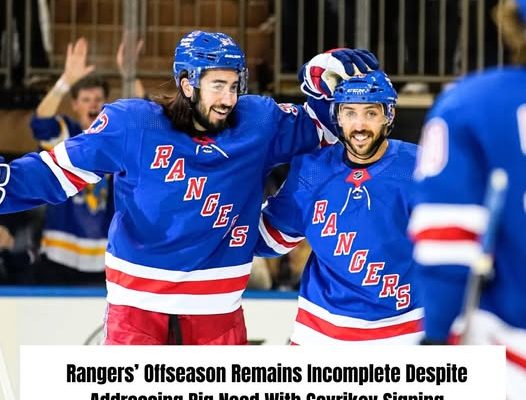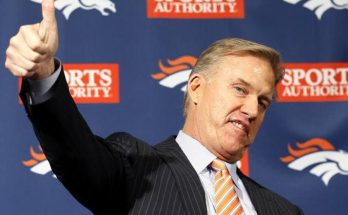The New York Rangers find themselves in the middle of a storm of criticism as the offseason progresses and the front office’s moves, or lack thereof, continue to dominate headlines. Despite securing the services of reliable defenseman Vladislav Gavrikov, many analysts and fans alike are voicing concerns that the organization’s efforts to bolster its roster have fallen short of what is necessary to compete for a Stanley Cup. The Rangers are a storied franchise with sky-high expectations every season, but this summer has left many wondering if the team’s leadership truly understands what it will take to close the gap with the league’s elite contenders.
The Gavrikov signing was undoubtedly a positive addition. The 28-year-old defenseman is known for his steady presence on the blue line, his ability to log heavy minutes, and his knack for playing a shutdown style against top offensive units. His signing was seen as a necessary move after the team struggled defensively during critical moments last season, especially in the playoffs where defensive breakdowns and lack of composure cost them dearly. Gavrikov brings experience and poise, but while he is a valuable piece of the puzzle, he is not the type of acquisition that drastically changes the trajectory of a team on his own. Critics argue that the Rangers need far more than one solid defensive addition to address the deeper issues that plagued them last year.
Much of the frustration stems from the team’s inability to make a splash in the forward market. The Rangers have a talented top-six core that includes stars like Artemi Panarin, Mika Zibanejad, and Chris Kreider, but their depth scoring has been inconsistent and often disappears in the postseason. There was widespread hope that the front office would bring in a proven goal scorer or a hard-nosed power forward who could provide the grit and secondary offense the team sorely needs. Instead, the team’s moves so far have been viewed as conservative, almost as if they’re content with simply “running it back” with a roster that already showed signs of stagnation last season.
Fans have been vocal about their disappointment, flooding social media with comments questioning the team’s direction. Many point to the Eastern Conference’s powerhouses, like the Florida Panthers and Carolina Hurricanes, both of whom have made aggressive moves in recent offseasons to strengthen their rosters. In comparison, the Rangers’ offseason strategy seems passive. While they were linked to several high-profile free agents and trade targets, including rumors about star forwards who could have elevated the team’s offense, no such deals materialized. This lack of decisive action has led to growing anxiety about whether the team can realistically contend next season.
The Rangers’ front office, led by General Manager Chris Drury, has defended its approach by emphasizing the importance of maintaining roster flexibility and not overpaying in what has been described as an inflated free-agent market. Drury has repeatedly stated that the organization is committed to building around its current core while developing its promising young players like Alexis Lafrenière, Kaapo Kakko, and Filip Chytil. The belief is that these younger players, if given larger roles and consistent ice time, can evolve into reliable contributors who will complement the team’s veterans. However, critics argue that this is a gamble the Rangers can’t afford to make, especially when they are in the middle of a win-now window with Panarin and Zibanejad still in their primes.
Another point of contention has been the team’s handling of its goaltending situation. Igor Shesterkin remains one of the league’s elite netminders and is arguably the Rangers’ biggest asset, but there is a growing concern that the team is leaning too heavily on him to bail them out. Last season saw numerous games where Shesterkin’s heroics masked the team’s deficiencies in front of him. Without significant improvements on both ends of the ice, there’s a fear that the Rangers are wasting the prime years of their franchise goalie by failing to surround him with a more complete and balanced roster.
One of the more persistent criticisms is that the Rangers seem stuck in the middle — not quite rebuilding, but not going all-in either. This “half-measure” approach, as some fans call it, risks leaving the team in a state of mediocrity. While they are good enough to make the playoffs, there is a consensus among many analysts that the current roster is not constructed to win a seven-game series against the NHL’s top contenders. The signing of Gavrikov, while solid, is seen as a band-aid rather than a transformative move. It improves the defense but doesn’t address the larger issues of scoring depth, physicality, and consistency.
There is also a growing debate about whether the team’s core needs to be shaken up. While Panarin and Zibanejad are both elite talents, there are questions about whether the current mix of stars and role players has the right chemistry to win at the highest level. Some insiders have suggested that the Rangers may need to explore a blockbuster trade to bring in a dynamic player who can energize the lineup and set the tone. Names like Connor Garland, Mark Scheifele, and even disgruntled stars from other markets have been floated as potential targets, but the Rangers have yet to pull the trigger on such a move.
The pressure on Chris Drury and the coaching staff has never been higher. Last season’s early playoff exit was a bitter disappointment for a team with championship aspirations, and the fanbase’s patience is wearing thin. The Rangers are one of the NHL’s marquee franchises, and with that status comes a relentless demand for success. Anything less than a deep playoff run is viewed as a failure, and the current offseason has done little to convince fans that the team is moving in the right direction. Drury’s insistence on staying the course may be rooted in long-term thinking, but in a market like New York, long-term plans often clash with the immediate hunger for winning.
The signing of Gavrikov does bring some stability to the defense, and his style of play could complement the Rangers’ other blueliners like Adam Fox and Jacob Trouba. There’s hope that with a stronger defensive structure, the team’s offense will have more room to thrive. However, relying on internal improvement alone — particularly from young players who have yet to fully break out — is a risky strategy. The Rangers have been down this road before, and history shows that a lack of aggressive moves during the offseason can come back to haunt them when the grind of an 82-game season and a brutal playoff gauntlet begins.
The upcoming season will be a defining one for this group. If the Rangers fail to take a significant step forward, the calls for major changes will grow louder. This could mean shaking up the core, making bold trades, or even revisiting the coaching situation. The window to win in the NHL can close quickly, and with teams like New Jersey, Carolina, and Florida all loading up to compete, the Rangers risk being left behind if they continue with a cautious approach.
In the end, the Gavrikov signing is a good move — but it’s not enough. The Rangers have added a reliable defender, but they still lack the offensive punch and physical edge that championship teams possess. Unless the front office makes additional moves before the season starts, this offseason will likely be remembered as one of missed opportunities rather than bold progress. For now, fans will hold out hope that the team’s existing stars can elevate their game and that the younger players will take the next step, but hope alone won’t be enough to silence the critics. If this season doesn’t deliver, the narrative surrounding the Rangers could shift from underachieving to outright regression, and the pressure to act decisively will become impossible to ignore.



